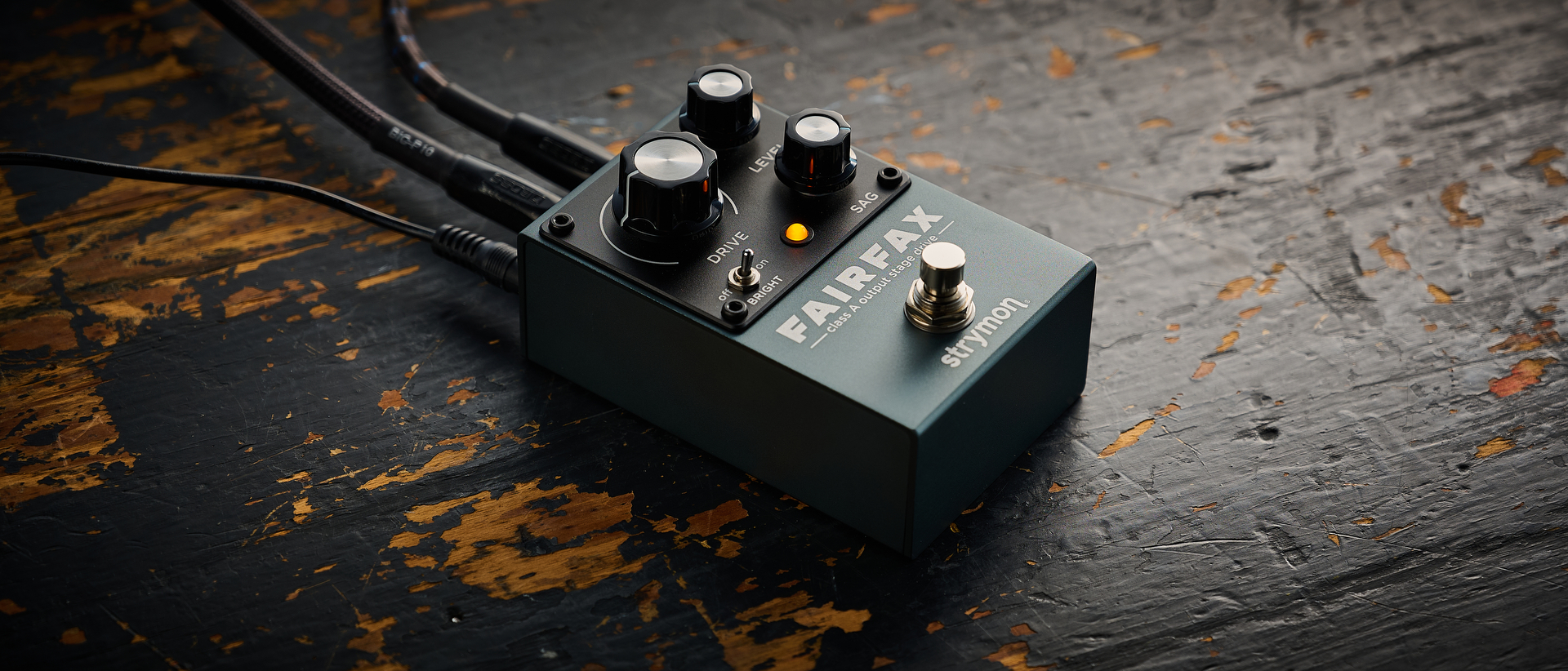All the latest guitar news, interviews, lessons, reviews, deals and more, direct to your inbox!
You are now subscribed
Your newsletter sign-up was successful
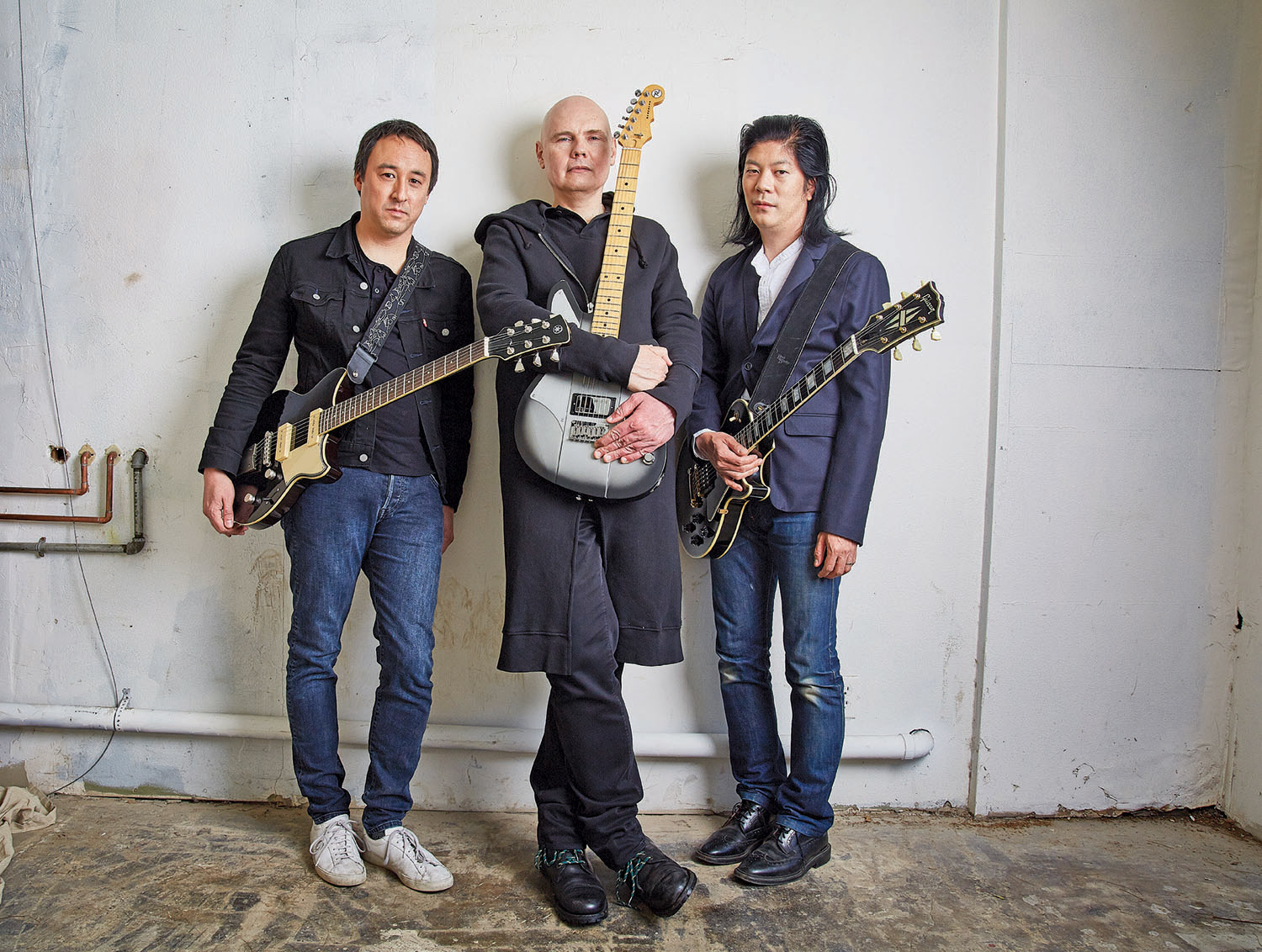
It’s a mid-spring morning, and Billy Corgan is feeling blissed out. Just yesterday, the reformed, nearly all-original Smashing Pumpkins hosted their first rehearsal for their hotly anticipated “Shiny and Oh So Bright” summer reunion tour, and in the chief Pumpkin’s assessment, things went…well, smashingly. “We fell right back into the groove,” he marvels. “It was a little surprising to me, because you never know what to expect. And it was rewarding, too. You realize that all that work meant something. We worked very hard in our time, and it shows. We play really well together, and more important, the relationships are intact. I couldn’t ask for more than that.”
Co-founding guitarist James Iha, who has returned to active duty in the band for the first time since 2000, echoes Corgan’s sentiments, albeit in a characteristically droll way. “It wasn’t a disaster,” he chuckles sheepishly. Quickly, he adds, “Not that I expected it to be—I didn’t. Actually, what was interesting was how easy things felt. It was a little like muscle memory—you kind of play parts without even realizing it. You know, they’re great tunes. A lot of them are classics. It was cool to get back in and play them again.”
For Corgan, the idea of putting the alt-rock titans back together goes back to 2005, when, following the breakup of his post-Pumpkins band Zwan, he took out full-page ads in Chicago newspapers and made his case: “I have made plans to renew and revive the Smashing Pumpkins,” he wrote. “I want my band back, and my songs, and my dreams.” It didn’t exactly pan out as he’d hoped, as only longtime drummer Jimmy Chamberlin signed on—and then he left and returned again. Over the years, several other members came and went, although Corgan did find a trusty collaborator and axe cohort in Jeff Schroeder, who has been a constant in the group since 2007. In the back of his mind, however, there always seemed to be unfinished business with Iha, whom he hadn’t spoken with in years.
As it turned out, Iha felt the same way. Since leaving the Pumpkins, he’d kept busy with various projects (producing, a solo album, film scores), and he’d found a second home as a semi-regular member of A Perfect Circle. But one day in 2015 he decided to call Corgan to see if they could hash things out over dinner and make sense of their past. “We hadn’t talked in so long, so it was nice to just finally do it,” Iha says. “It wasn’t about me playing in the band again or anything like that. It was just to catch up, you know? To see how we were. How we were together.”
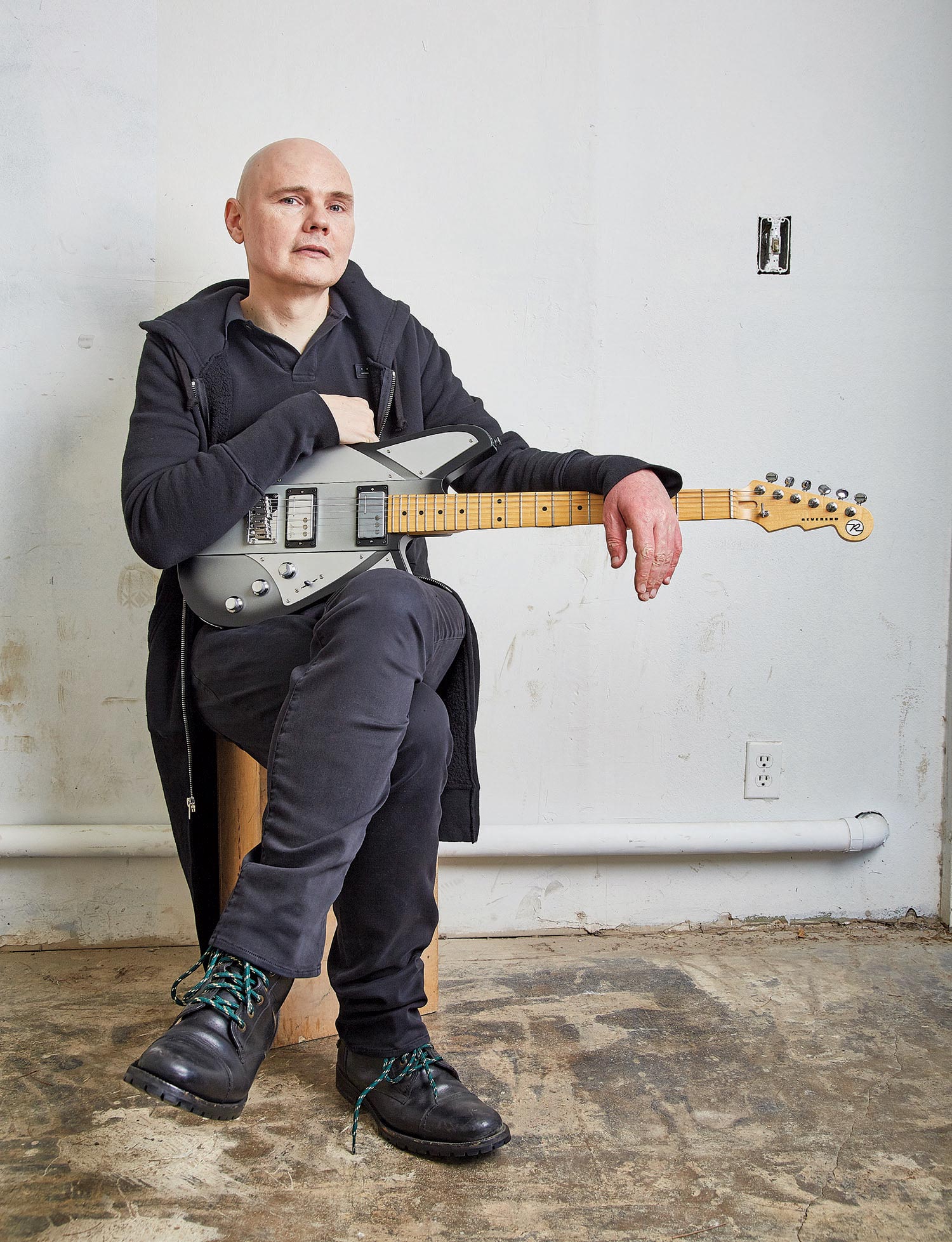
With a fair amount of fence mending behind them, the two old colleagues did wind up playing together again. Iha turned up on stage at several Pumpkins shows in 2016, and rumors began to circulate that a full-on reunion of the “classic Nineties” lineup was in the cards. Corgan and Iha were game, as was Chamberlin. The only problem was founding bassist D’arcy Wretzky. Her split from the band in 1999 was an acrimonious one, and in the ensuing years her relationship with Corgan remained icy. The two seemed to call something of a truce last year, but then in typical Pumpkins form, varying stories about what happened next emerged. Wretzy claimed in the press that, after exchanging texts with Corgan about a possible reunion, an offer was made to her and then rescinded. Corgan went on record disputing that account.
“I was pretty public about wanting her to be involved,” he stresses. “I think it would been the best for everybody, including her, but it just didn’t work out.” The topic of Wretzky is clearly one he doesn’t wish to belabor, and after a long sigh he concludes, “I’m not in any hurry to throw any more gasoline on the fire. It is what it is. She’s done, and that’s that.” Iha stayed out of the back-and-forth between Corgan and Wretzky, but he offers the view that “Billy tried his best. In the big picture, I think everybody is at different points in their lives, and whoever can work it out and get it together with the band can do it. It’s just one of those things.”
The 2018 lineup of the Smashing Pumpkins now includes bassist Jack Bates, the son of Joy Division and New Order’s bass player Peter Hook, and the band’s formidable guitar roar has been expanded to a triple-axe attack: Schroeder is still part of the gang, and he couldn’t be happier about playing with Iha. “The whole thing is rather funny to me,” he says. “People seem to think that James and I should be enemies—you know, like, ‘He’s taking your job.’ But we’re totally cool, and there’s been no weirdness at all. In the short time that we’ve been together, it’s been extremely pleasant. And musically, it sounds great—we’re not fighting for space or anything like that. This is going to be amazing.”
All the latest guitar news, interviews, lessons, reviews, deals and more, direct to your inbox!
Earlier this year, the three guitarists and Chamberlin convened with producer Rick Rubin, with whom Corgan had worked on his acoustic-based solo effort, Ogilala, to record a number of fresh tracks that will be released as two EPs, one issued before the tour and the other upon its conclusion. At the time of our interview, the only song that was made available for preview was “Solara,” and it serves as a bracing, four-minute refresher course on everything that was good and righteous about the Siamese Dream/Mellon Collie-era Pumpkins. Brimming with roiling guitars, rat-in-ac-age-like vocals and extravagant drumming, it also offers firm proof that there’s plenty of gas left in the tank for this lineup to run on…should they choose to.
Obviously, a reunion tour is a big financial incentive for everybody, but beyond that, what were the other motivations to get back together?
BILLY CORGAN: Quite honestly, it was all rooted in the personal relationships, and whether or not there was enough strength to withstand everything else that comes with trying to do something like this. It’s more of a personal thing. I really wanted us to kind of heal the rift, and I think we have. Music seems to be the balm for that.
JAMES IHA: As one of the original members, it’s a deep bond to grow up with this band and play these songs and everything that goes along with it. You’re a family. You’re traveling together, playing and living together all the time. It’s like college and family and work all rolled up into one. And like college, it’s also a big learning experience.
JEFF SCHROEDER: I’m really excited to be a part of this and to see how far it’s come. I’ve been in the band for 12 years now, but I gotta tell you, when we were in the studio in Malibu, and I’m in the room with Billy, Jimmy and James, and I look through the glass and there’s Rick Rubin standing there, I had a little bit of a “Whoa, how did I get here?” moment. It was pretty interesting, to say the least.
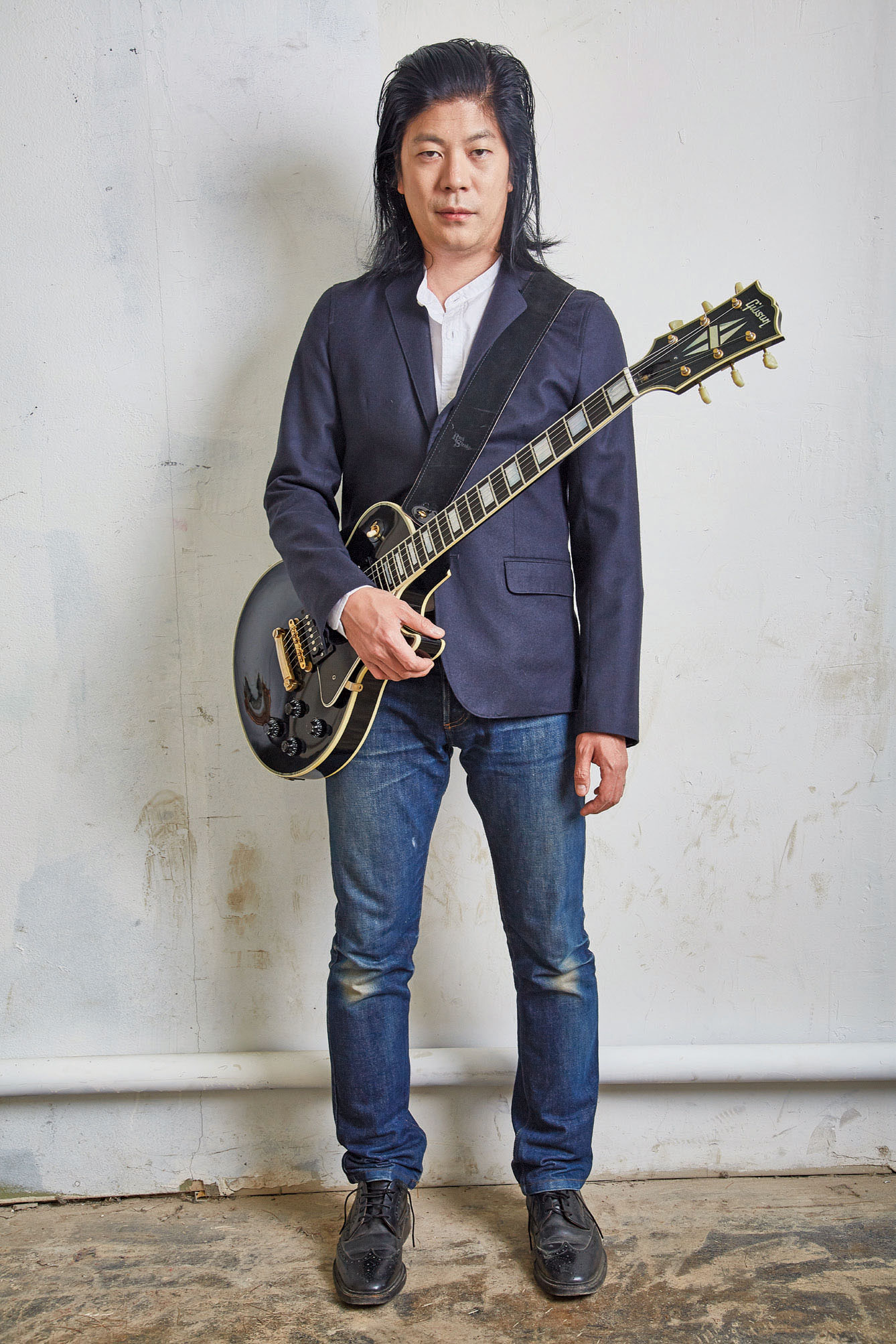
I have to ask, Jeff, were you ever concerned for a brief moment that the return of James might endanger your position in the band?
SCHROEDER: No, not at all. Billy was extremely transparent about things from the beginning, and he always said I would be part of it. There was never a time in which I wasn’t. I knew that the whole time.
CORGAN: Look, Jeff has put 12 years into the band, and that’s a very serious commitment. He’s dedicated his life to the band, and I feel he’s earned this. Not only is he a great musician, but he’s also very responsible for a lot that goes on behind the scenes. I really didn’t see any way this could work without him.
IHA: Jeff’s a nice guy, and he’s a great musician. I don’t have any kind of drama with him at all. After practice, I was like, “Do you want to play that, or do you want me to play that? I don’t really care which of us plays what.” It’s very ego-less between us. He’s a nice guy.
Even so, Billy, what were your thoughts about putting James and Jeff together? Did you wonder whether it was a little like putting your current wife in a room with your former wife?
CORGAN: Honestly, I didn’t spend a lot of time on that kind of thing. Jeff is such a quality person, so I didn’t have those kinds of concerns. That he and James would get along seemed pretty self-evident to me.
It’s a funny thing, though: People have these ideas about the band, that it was always these four people, but that wasn’t always the case. By the mid Nineties, Jimmy was out of the band, and the Frogs [Dennis and Jimmy Flemion] were in. We’ve had a lot of people come and go. The band has taken on various guises. Outside of a brief kind of reunion of the four of us in 1999, which lasted for all of four months, it hasn’t been that intact for a very long time. So since 1996 it’s been people coming and going. And I’ve had to accept that as our story, even though I would have liked the fairy-tale version where it was just the four of us, like a U2 or something.
Walk me through the process of how you went into the studio to make new music with Rick Rubin.
CORGAN: I had a couple of ideas that I sort of set aside, just in case the band ever got back into the studio. Before I reunited with James, I don’t want to say I’d given up on the band, but I pretty much set it aside as a done thing in my mind. I just didn’t want to shoulder the burden on my own anymore. I was very focused on what I was doing on the acoustic side, and there were other things, too: I had a new baby, and life was kind of moving in a different direction. So I set those songs aside, like, “OK, if we ever get back together, this is a good place to start.”
Once we did, we went to Village Recorder for three weeks and did demos. I think we did about 16 songs in the three weeks, and then I played Rick Rubin what I thought were the best eight. I thought he’d pick just one to do as a single, which was kind of the plan—“Let’s put out a single to launch the tour.” But he wanted to do all of them, so the whole thing grew from there, and now it’s going to be two EPs. It was quite surprising.
IHA: It was good. Rick is, obviously, a great producer, but he’s also a great guy and has a vision. He knows what he likes, knows what he doesn’t like. He’s always helpful, motivational. As far as the band working together, it was easy. The songs were good, and I think I was able to try a lot of different things.
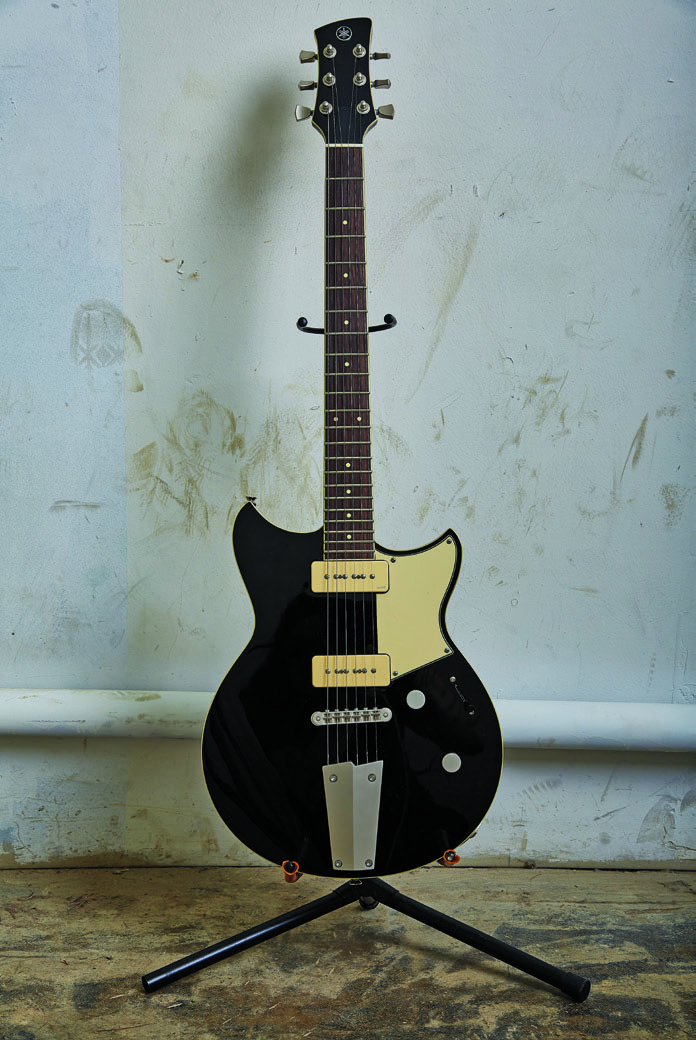
How did you go about the actual tracking? There’s always been so much guitar orchestration on Pumpkins songs.
CORGAN: We went back to work [the way] we’d always done things: We would sort of track together and then figure out who should do what. There’s a lot of guitar work, so you really have to map it out. You kind of set the thing in its particular direction and make sure everybody is on the same page about where it’s going.
Once you’re past the tracking stage, then it’s down to, “OK, everybody has a chance to contribute.” That’s where things get to a deeper level, fleshing out ideas and trying things. You kind of open the floor up for discussion. Now, the thing is, you don’t want to change the direction of the track and throw out a bunch of work you’ve already done—that’s something we learned over time. You have to be very efficient about how you approach all the guitar work.
SCHROEDER: It was really about coming up with ideas and seeing what’s best for the song. Everybody would take home basics and figure out what was needed. I never had a problem coming up with ideas. It was just “typical Pumpkins.” The only real problem was knowing when to stop. Sometimes we get a little overdub crazy.
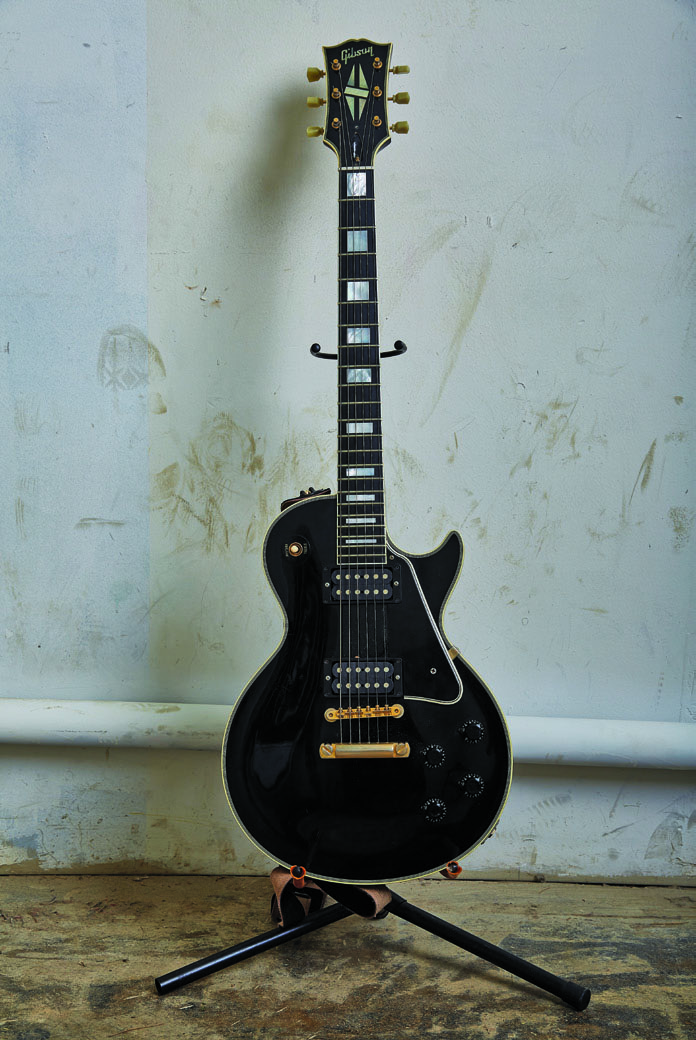
You didn’t work with a designated bassist in the studio, though.
SCHROEDER: No, we didn’t. It varied song by song. When we’re doing basics, it might mean Billy on piano, I’m playing bass and James is playing guitar. Or Billy played bass. Whatever worked with the drum tracks.
“Solara” sounds like great, classic Smashing Pumpkins. When you recorded, did you give any thought about maintaining the band’s signature sound?
CORGAN: I didn’t pay much mind to evolving the group’s sound. My focus was on making good music, and if it turned out sounding that way, that’s fine. Funnily enough, by not putting any pressure on it sounding a certain way, it seemed to connect back to the earlier work organically, without any sort of conscious effort on our part.
IHA: I don’t think we talked about it that much. We weren’t like, “We’ve got to be playing this classic sound. Does this riff sound like something from a classic Pumpkins record?” If you do that, you’re never going to come up with anything. It’s just too hard to do it like that.
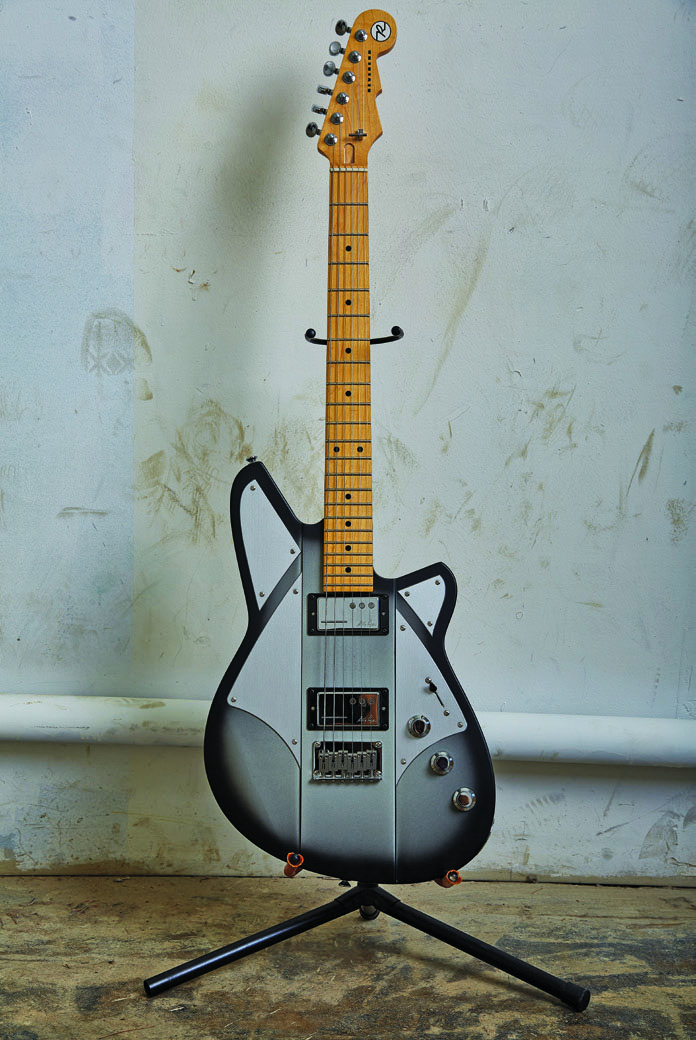
Billy, you mentioned “opening up the floor for discussion.” In the past, you wielded a bit more of an iron hand in the studio.
CORGAN: I do feel as if I’ve learned how to listen and to be more open. This isn’t an excuse, but in the past I was under a lot of pressure, both from labels and the situations we found ourselves in as a group. Now I have the luxury in that I want everybody to walk out of the studio feeling pleased about what we’ve put together. Everybody had their opportunity to say what they want to say, and I feel really good about that.
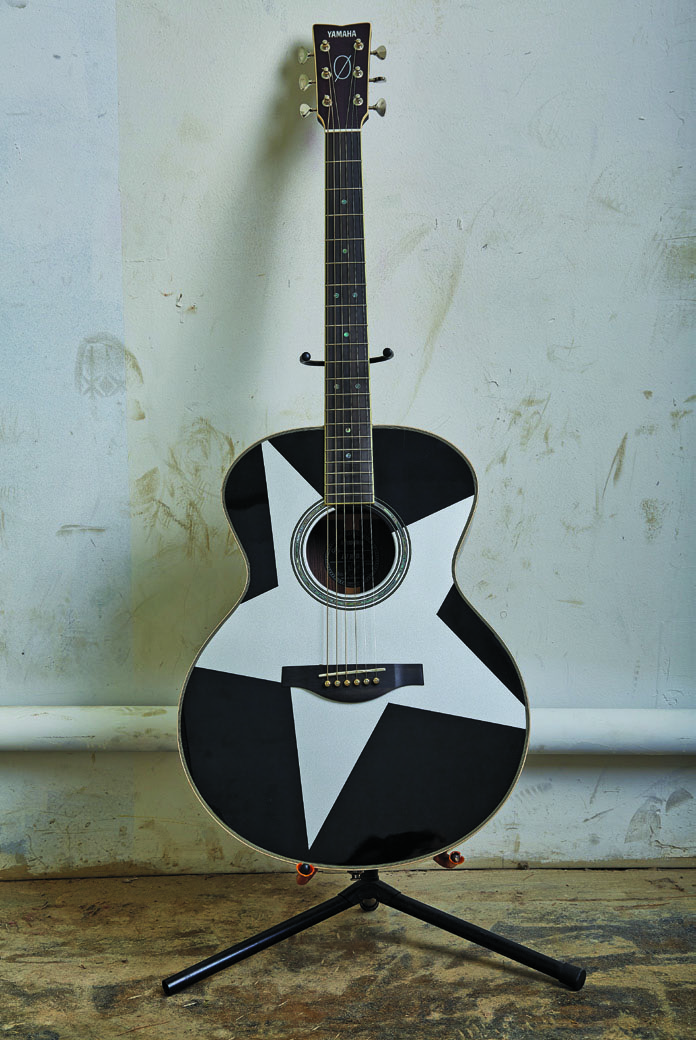
You’ve only had one rehearsal so far, but what kind of discussions did you have about moving from two to three guitarists?
CORGAN: We actually sat down and said, “OK, how is this gonna work?” I think the best approach is to figure out how to voice guitar parts so that they’re similar to the records, rather than doing an impressionistic version of the records with two guitars.
SCHROEDER: On this tour, we want to sound more like the records than ever before. It’s going to be a different type of show than anything we’ve ever done, and from a musical point of view, we’re not going to do deconstructed versions of the songs. Having three guitars obviously helps in being able to deal with all the overdubs and what not.
CORGAN: In some cases, I might be able to play a little less, but there are times when it doesn’t sound right if I’m not playing. I’m kind of pressed into duty sometimes when I’d rather not be. Yesterday we played “Rhinoceros,” and I had to play the lead break. I haven’t played that song in maybe 10 years, and I haven’t played rock in a while. My soloing is pretty rusty. This morning I thought, “Maybe I should just have Jeff play the lead… .”
IHA: It’s still a rock band. It’s just one more guitar. [laughs]
Have you figured out which guitars you’re going to use? In the past, Billy, you would play a Strat, and James, you played a Les Paul. How does that change with three guitars?
CORGAN: It’s a song-by-song issue. We did an old song yesterday, and I used my Reverend guitar, which has a little bit of a humbucker sound, and James was playing a Les Paul. But it didn’t sound right to me because the sound of that song is very much the Strat with the Les Paul rhythm. I told my guy, “You gotta dig out one of those Strats.”
IHA: I think I’ll stick to the Les Pauls. For the most part, with the Pumpkins, and even in A Perfect Circle, I just have to play a Les Paul. They just have that heaviness I like.
SCHROEDER: I’ve been thinking about my amps a lot. I found an amp by a maker here in Chicago named Brian Carstens; he’s the repair guy at Chicago Music Exchange. He has this model called the Warm Machine, and it’s a 50-watt Sixties-type of amp. It’s very clear, with lots of sustain and energy. I used it for the recordings, and it sat on top of the other guitars really well.
James, you brought up A Perfect Circle. What’s your status with that band? Are you on an extended hiatus?
IHA: Yeah. Those guys are great. They’re nice guys and great to play with. Obviously, I can’t play with them right now, but I hope in the future I can. They have to tour and promote their record.
Billy, a while back you tweeted a set list for the tour. All the hits were there, but you also listed some covers: Led Zeppelin’s “Stairway to Heaven,” Joy Division’s “Love Will Tear Us Apart,” Bowie’s “Space Oddity” and Depeche’s Mode’s “Never Let Me Down.” Are those covers still planned?
CORGAN: That set list is still pretty accurate. We’ll probably do the new single, “Solara.” A few things might change. The Joy Division song is out, and so is “Never Let Me Down.” But we’re definitely doing the Zeppelin song.
Of all the Zeppelin songs to cover, what made you go with “Stairway”?
CORGAN: Oh, you’d have to get into the inner-Pumpkins psychology on that one.
Well, that’s why we’re talking. Fill me in.
CORGAN: Nah. I don’t talk about that stuff anymore. I’ve grown crusty in my old age. [laughs]
With three guitars, what are the chances of you doing some Skynyrd?
CORGAN: I would love to. I mean, that’s the epitome of the three-guitar band, right?
IHA: It’s possible. Never say never. [laughs]
SCHROEDER: Or maybe we could do some Molly Hatchet or .38 Special.
CORGAN: I think .38 Special is in the three-guitar family free. They’re sort of the stepsons to Skynyrd, no?
IHA: “Hold on Loosely,” “Caught Up in You”—I have those on playlists. You don’t really hear bands do that kind of thing today. You have this rock band playing a pop song, but then the guy starts playing this incredibly melodic lead that goes on and on. That stuff was great.
Unlike a lot of bands that do reunion tours, you guys have recorded new music. Is this the sign of an ongoing alliance?
IHA: Well, I try not to think too far ahead. But yeah, I think with the tour, it was important to do new music and make it feel like we’re a living, breathing entity. I’m trying not to get too far ahead of myself. Like people say in sports, “One game at a time.”
SCHROEDER: We’ve been pleasantly surprised that the recording process went so well. It was quite apparent that there was a lot of energy, and it was very natural and unforced. Under the right circumstances, we could make a lot of new music together.
CORGAN: I would hope things can continue, but I’ve learned not to let my mouth write the future.
Joe is a freelance journalist who has, over the past few decades, interviewed hundreds of guitarists for Guitar World, Guitar Player, MusicRadar and Classic Rock. He is also a former editor of Guitar World, contributing writer for Guitar Aficionado and VP of A&R for Island Records. He’s an enthusiastic guitarist, but he’s nowhere near the likes of the people he interviews. Surprisingly, his skills are more suited to the drums. If you need a drummer for your Beatles tribute band, look him up.





